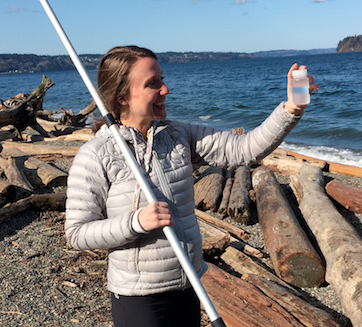
Activating volunteers, educating students and informing local management
The South Sound Chapter, based in Tacoma, Washington, started its BWTF water testing program in 2011, when they established a partnership with a science teacher at the Tacoma Public School's Science and Math Institute (SAMI). The chapter secured surplus lab equipment from the State, donated it to the school, and uses chapter funds to purchase the equipment and supplies used to collect and test the water samples for bacteria levels.
The South Sound BWTF currently monitors six public beaches around the Tacoma area. Chapter volunteers collect water samples from their designated beach, and deliver them to the high school, where the teacher and his students process them in the lab, and post the results on the BWTF website. The program provided a hands-on citizen science experience for chapter volunteers, and an educational experience for the students. See a map of the chapter's sampling sites and check out their data on the BWTF website.
In 2013, a new chapter BWTF coordinator expanded the number of beaches sampled, and began coordinating with the Tacoma-Pierce County Health Department's Swimming Beaches program and the Washington State Department of Ecology's BEACH Program to ensure that the chapter sampling protocols align with the agency programs.
During the summer recreation season, the County Health Department monitors high-use beaches weekly or bi-weekly, and posts results online. The chapter has adjusted its sampling schedule this past year to help the County extend its regular beach testing program into the colder months, when they did not generally test but recreational users such as divers and paddlers are still very active. The chapter alerts the State and County when the BWTF program detects high bacteria levels at their sampling sites, and the County goes back out, retests, and issues swimming advisories and beach closures if the results still exceed health standards. The program provides a great collaborative opportunity for an educational institution, Surfrider volunteers, and local health agencies to work together to provide better protection for beachgoers and water recreational enthusiasts in Tacoma.
